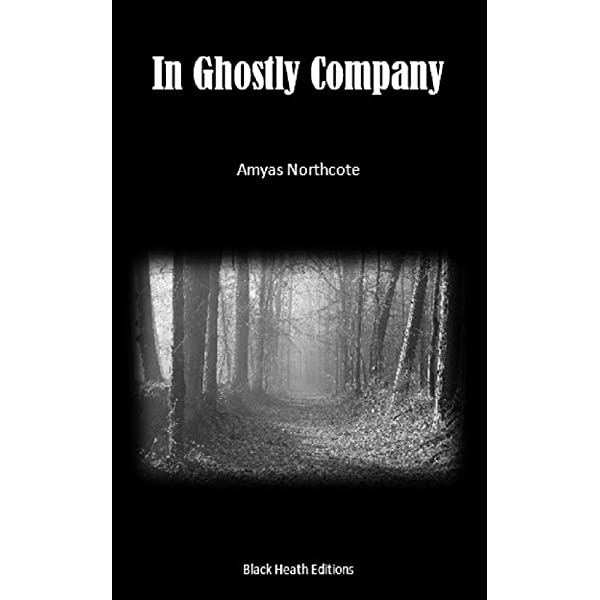Readers unfamiliar with the story "Mr. Oliver Carmichael" may prefer to read these notes only after reading the story.
"Mr. Oliver Carmichael" from In Ghostly Company (1922) by Amyas Northcote appears on the contents list for the new 2023 Snuggly Books anthology The Zaffre Book of Occult Fiction, edited by Brendan Connell.1
It's a story that comes very near perfection. Indeed, if Northcote had had the will to forgo melodrama and uplift at the end, there would be a higher opinion today of his abilities and his collection In Ghostly Company. This is underscored by the excellence of several other stories in the collection, most notably "Bricket Bottom" and "The Late Mrs. Fowke," which I have preached about here.
For most of its length, "Mr. Oliver Carmichael" seems ready and able to contend with LeFanu's "Green Tea." Oliver Carmichael, meek and mild civil servant, finds himself for the first time in his life targeted by the blind and arbitrary machinery of the universe.
Always a contented bachelor, he habitually ignored the matchmaking wills and wiles of friends and a phalanx of potential mothers-in-law in high society. In short:
[....] he was: an easy-going, high-minded, good fellow, who had never been confronted with any serious problem in life, and whose aim was to lead a quiet and honourable existence in charity with all men.
Until the day he had to replace a pocket-handkerchief while on the go.
The day was yet young and the shop was nearly empty of customers. Mr. Carmichael made his way to the counter indicated and a young woman stepped forward to serve him. Instantly he experienced a most curious and unpleasant sensation for which there was apparently no reason. He felt an instinctive and violent repulsion to the girl; he glanced at her more closely, but there was little externally to account for his feeling. The young woman appeared to be of the usual shop-girl class, modest and demure in manner and neatly and quietly dressed. She was a tall and strongly built person, apparently about twenty-five years of age and—was actually ugly. Not only were her features unprepossessing, but there was an indefinable look about them of something evil, not in any positive sense, but rather negatively; it was the look of one whose thoughts and aspirations were set on a low and maleficent plane.
Mr. Carmichael purchased his handkerchief and paid for it by handing the girl a sovereign. Up to the present she had paid him no more attention than was demanded by her duties, but as she gave him his change she looked him straight in the face, and he saw, for an instant, a look of exulting triumph flash into her eyes. She instantly averted them. Oliver turned to leave the shop, feeling a faint sensation of fear, an indefinite fear of something that he could not understand. As he reached the door he turned and looked back; the girl was watching him steadily.
Like Le Fanu's Rev. Mr. Jennings, Oliver Carmichael has--through no fault or action of his own--crossed an unmarked threshold.
[....] the personality of the girl began to oppress him, her image kept rising before him, and it was an image presaging ill and wretchedness to himself. All day the affair haunted him and, even in the evening at his Club and during his usual quiet game of bridge after dinner, that baleful look of evil triumphant in the girl’s eyes continued to obtrude itself. When at last he went to bed and finally fell asleep he dreamed again, and this time the recollection of his vision remained with him the next day. He dreamed that he was alone on an apparently desert plain, enveloped in a luminous grey mist, which whirled round him in sweeping masses ever driven by the wind. Across this plain he was journeying, exactly whither he knew not, but filled with a set purpose to reach his unknown destination. Suddenly out of the mist a figure loomed up, which he instantly recognized as that of the shop-girl. She came towards him, her eyes gleaming with an evil joy. In wild panic he turned and fled, forgetting his destination, careless of his fate, seeking only to escape from the swift moving figure which pursued him. The grey luminosity around him grew darker, his confusion increased, the threatening pursuer gained upon him. He woke with a cry; daylight was stealing into the room.
Taking vacation in Brighton:
change of scene did not serve to distract him from his prevailing obsession. He thought very often of the girl, of whom he now had an unutterable loathing, and he also found himself pursued by other thoughts. Hitherto his life’s habits had induced in him a train of pleasant and amiable ideas, not perhaps marked by any special eminence in the way of ability, but the thoughts of a clean-minded, honourable man. Now he found himself imperceptibly drifting into other trains of thought: evil notions passed through his mind, views of humanity taken from a hostile and a wicked standpoint, impressions of the worst side of human nature obtruded themselves. He fought desperately against these new ideas, but he felt it was a losing fight; he began to lose all confidence in himself, his integrity, his honour; he began to despair.
Back in the city, he returns to the shop.
She asked him his needs. Mr. Carmichael hesitated and then blundered out the first thing he could think of. Gloves. She produced them and asked him his size; Mr. Carmichael had forgotten, his valet usually bought such articles for him. Then she must measure his hand.
He held it out and she stooped to her slight task. As she stretched the glove across his hand she touched it with her own, momentarily, perhaps accidentally. The touch sent a shock as of electricity through him, all his self-possession vanished, all his belief in the unreality of the past few weeks. For one blinding instant he saw into deeps hitherto unsuspected and sensed a horror hitherto undreamt of. Scarcely knowing what he did he took the gloves, paid for them and stood for a moment looking at the girl.
[....] Suddenly she raised her eyes and looked straight into his own and once more he saw a blaze of exultation, a look of power light them up. She knew herself mistress of the situation; she knew and understood the secret links that bound him to her, links that he felt dimly controlled him, but the nature of which he could not comprehend.
After more weeks of agony, he arranges another meeting.
“What has happened to me?” he said. “Who are you, what do you want of me? I am at sea.” She answered slowly:
“You have asked several questions, the full answers to which you are not yet fit to understand, but I will tell you something. Who am I? Well, you will find out some day who and what I really am, but you may now call me by the name my parents gave me, Phyllis Rourke; I was not always, even here, what I now am, a shop-girl. My father was a man of wisdom, a gentleman who taught me how to learn”—she hesitated—“many things, truths, facts, which are obscure to you and all your like. What do I want of you? Well, much, and much that you will dread to part with, but I hold you”—she detached a blossom from her dress and held it in her hand—“like I hold this flower, and I can crush you as I do it.”
Later in their talk he threatens to report her to the police.
"....Oh, you poor fool! How little you understand. Since that night five weeks ago when first I found you, before you saw my living face, have you learned nothing? You talk of your position, of your social influence; you prate of the police.” Her eyes, dark and gloomy, seemed to devour him as she went on: “What can you do? I hold you and shall always hold you. I may never see you again in this body, I want nothing of your material life, I want something more, I want you yourself, I want your soul.”
He shrank back in horror. “Are you the Devil?” he said.
She burst into a fit of terrible, silent laughter.
“The Devil,” she said, “we are becoming quite mediæval. Do you expect to see this foot,” and she pushed forward her own, “turned into a hoof? Are you waiting for me to take out a parchment to be signed in your blood?”
She laughed again
“No, Mr. Carmichael,” she went on, “I am not the Devil. Perhaps you would be better off if I were.”
Ӂ
This is the halfway point in "Mr. Oliver Carmichael." His unwilling journey of self-discovery has just begun.
Famously, "explanation is the death of horror," a statement never truer than when applied to "Mr. Oliver Carmichael."
Amyas Northcote employed narrative uncertainty very effectively in "Bricket Bottom" and "The Late Mrs. Fowke," but here he calls on the hoariest occult clichés to explain a story far more disturbing without such a spelling-out.
Jay
[1] Contents:The Zaffre Book of Occult Fiction
W. B. YEATS: Rosa Alchemica
C. W. LEADBEATER: The Perfume of Egypt
E. F. BENSON: The Confession of Charles Linkworth
WILLIAM T. HORTON: A Legend of Life
JACK EDWARDS: The Ghost Friend
ALGERNON BLACKWOOD: The Wings of Horus
JESSIE DOUGLAS-KERRUISH: The Swaying Vision
NEVILLE MEAKIN: The Paper Man
PRINCE IMMANUEL OF JERUSALEM: When I was Dead
RALPH SHIRLEY: The Man Who Killed God
D.N.J.: The Moon-Gazer
ETHEL ARCHER: The Unfinished Prayer-Mat
AMYAS NORTHCOTE: Mr. Oliver Carmichael
DION FORTUNE: Blood Lust
MAY SINCLAIR: The Token
KENNETH MORRIS: Bach’s Fugue in D-Minor
L. ADAMS BECK: Hell
TOM LEON: Cat Souls
CHARLES WILLIAMS: Et in Sempiternum Pereant
MONTAGUE SUMMERS: The Grimoire
MARY BUTTS: Mappa Mundi
https://www.snugglybooks.co.uk/the-zaffre-book-of-occult-fiction/9





